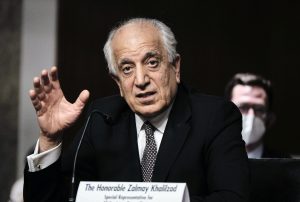“To be clear, there was no option to continue the status quo,” U.S. Special Representative for Afghanistan Reconciliation Zalmay Khalilzad said in prepared testimony before the Senate Foreign Relations Committee on Tuesday.
Khalilzad framed President Joe Biden’s April 14 decision to chart a withdrawal of U.S. forces from Afghanistan as the product of four judgments, which the president had outlined in his speech. First, the “original objective” of the U.S. war in Afghanistan had been essentially achieved, with al-Qaida “significantly degraded” and Osama bin Laden “brought to justice.” Second, Khalilzad noted “the world has changed since 2001.” While the al-Qaida threat has since dispersed around the world, there are other “urgent challenges.” Biden outlined these as China, the pandemic, cyber threats and “managing emerging technologies.” Third, continuing the policies of the past 20 years “would entail high ongoing costs without commensurate outcomes.” And finally, when Biden came into office there was an agreement in place for U.S. and coalition forces to withdrawal by May 1. “To reverse course would have meant an return to war with the Taliban – a war that would have continued indefinitely,” Khalilzad said. He went on to note that the intra-Afghan negotiations would have also been undermined had the United States decided to remain in Afghanistan.
With the May 1 deadline looming, and all but impossible to responsibly meet, the Biden administration had to decided either to stay or to plot a timeline toward an exit. Arguably Washington hoped the Taliban would accommodate a delayed, but eventual, departure as within the confines of the February 2020 deal.
Under that deal, the Taliban did cease attacks directly on U.S. forces — although the group continued to press Afghan government forces and did not distance itself from al-Qaida. Anticipating Biden’s decision to stay in Afghanistan past May 1, the Taliban threatened to renew attacks and issued a statement that it would not attend “any conference” — most immediately a reference to the hoped-for Istanbul summit — about Afghanistan’s future until all foreign forces had departed. It reiterated that sentiment after Biden’s decision.
Khalilzad, in his testimony, stressed that “We have made clear to the Taliban that if they attack us as we draw down, we will defend ourselves forcefully.” That echoed previous statements from Department of Defense officials.
It’s a tense stalemate, for now.
Meanwhile, the U.S. is making moves toward the drawdown it has pledged to begin by May 1. On Tuesday, the U.S. State Department “ordered the departure from U.S. Embassy Kabul of U.S. government employees whose functions can be performed elsewhere due to increasing violence and threat reports in Kabul.” The Associated Press’ coverage of the announcement categorized it as a “big drawdown” but specific numbers are not available. The head of the U.S. mission in Kabul, Charge d’Affaires Ross Wilson, said in a series of tweets that the order affected a “relatively small number” of staff.
Beyond the risky nature of any withdrawal process, the biggest questions lawmakers in Washington had for Khalilzad related to U.S. counterterrorism capabilities after exiting Afghanistan and concerns about the gains made, particularly for women in the country.
Khalilzad shared their concerns but stressed that the future of Afghanistan is, and must be, in Afghan hands. “In the end, however, it will be up to the Afghans to seize their opportunities… Afghanistan deserves a chance to find its own way forward, with help and encouragement from its friends, led by the United States.”
As the Washington Post’s Karen DeYoung wrote:
Committee members were broadly bipartisan in their negative predictions about Afghanistan’s future, and few had anything positive to say about President Biden’s withdrawal decision.
But while many warned of a growing terrorist threat, the likelihood that gains for women, children and minorities would be reversed under inevitable Taliban rule, and the difficulty of Biden’s decision, none said it would be better to stay.

































